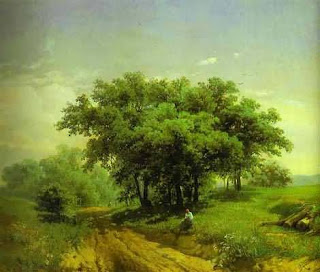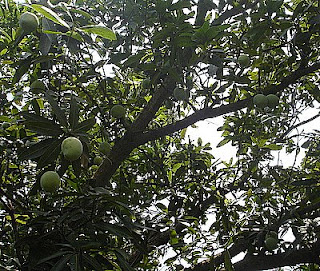 “I am glad, I live,
“I am glad, I live,Where seasons change
I like my world
To rearrange….”
I read these words in the Airlines’ magazine during a flight to Kolkata last month and I smiled. The rearranging of the world with changing seasons ,it brings back so many memories. Be it the beginning of winter in October and taking out of woolen clothes or the anticipation of rains in June-July, checking out the first winter roses in December or the comfortable sunshine of march …every season has so many memories , so many daily ritual associated with it. Today when I boarded train for Lucknow , my mind was full of expectations for viewing familiar sights of a typical North Indian summer on the way. O yes, it is already May .and the time is ripe for preparing the combat against the blazing sun and irksome ‘loo’…..the dusty storms and rituals of beating the heat in the traditional ways - the freshening Neembu sherbet or melons, thandai served with homemade potato wafers in the evening or gulps of sour-sweet aam-panna before you step out of the house . The delicious Aam-panna -even as I write these two words- I can feel the scent of raw mango around me. It is a portent of summer- it’s arrival is eagerly awaited in my land . Mango blossoms with their acrid scent are usually visible by march and as soon as the mango fruit is big enough to be eaten raw , preparations start in a big way for making mango chutneys, pickles, panna and many more delights of this king of summer .

There is still time for the fruit to ripe and savored as a dessert . My train will pass through Malihabad, a region near Lucknow which is so famous for its Dussehri mango that few year back authorities started international flights from Lucknow to the gulf countries exclusively to export this mango . It is a great favorite in India as well. You travel from Lucknow by train or by air in June –July and you will find every other passenger carrying boxes of mangoes .
But summer is not all about eating. It also reminds me of those khus scented afternoons when a siesta was a must. However much we pleaded , mother would not allow us out in the sun . Huge coolers will be installed in the bedrooms and these will be dutifully filled with water twice a day . Today we don’t get real Khus grass easily . The Cooler perfume has replaced it in most houses . Ironically when the sun goes at its brightest best India decides that it is time to move out of house. It is a period of summer vacations after all. And as Kalpish Ratna wrote in one of their articles -“ Every summer India escapes into itself. Every May it burrows deeper into the labyrinthine warren of friends and relatives whom it loathes for the rest of the year. May brings a mad caper to reclaim family. Demented uncles, dying aunts, cousins long since gone to the dogs, nieces strictly unmentionable, nephews better not recognized, princes, pauper, drunks deadbeats, the detritus of genetic mishaps several times removed- how come we didn’t know , even as recently as April that they were family? But now we have all the May and half of June to correct that.”
So the trains were full . Special summer trains also ran on tracks to ensure these family re-unions, where aunts always exclaim (with almost genuine) delight : how kids have grown up since they last visited her…how so and so has thinned down and why this and that has not come with us etc etc. Then the next ritual of formalities would start with exchange of gifts from the two sides( each taking it while saying : what was the need to bring all these?)
Evenings were be very pleasant, very homely .After sunset plants would require watering . With scented bela, jasmine, chameli and other creepers in the background, lawn chairs were taken out and this used to be the venue for the evening family get together. Summer months also have pleasant memories of sleeping out either in the lawns or on the roof – with mosquito nets on and sometimes table fans too. In the age of centrally air-conditioned houses , I still miss those lively antaksharis which we used to play before going off to sleep . Most of the slokas, dohas, urdu couplets and choupais I remember now were learnt in those days only. (Film songs were a complete no-no for the game ).
There are so many things I miss about those happy summer days. More than the ‘things’ I miss the emotions associated with the season- mother’s anxiety when we ran barefoot in blazing sun to get some kulfi from the kulfiwala, my maternal grandmother’s delight to see us after one year, our embarrassment to be introduced to so many unknown ‘close relatives’ and many more . I think, Ghalib must have felt somewhat similar longing for the days gone by when he wrote –
Muddat hui hai yaar ko mehmaa'n kiye hue
josh-e-kadah say bazm charaagha'n kiye hue
ji dhoondhta hai phir wohi fursat, ki raat din
baithay rahay tasavvur-e-janaa'n kiye hue
I guess it is the excitement of witnessing the changing colours of the season that makes this rearrangement so memorable. Seasons may be part of the cycle of the year but each one of them is complete in itself. Or should I put it the way Khalil Gibran did when he says-
But if in your thought you must measure time into seasons, let each season encircle all the other seasons,
And let today embrace the past with remembrance and the future with longing.
1 comment:
I can relate to all the emotions alluded by you especially meeting the extended family members who we woulddle meet every few years only during weddings. Sadly , with the passage of time and the antipathy of companies to allow long duration leaves to employees , one has only a week to relive the glorius summer in the carefree manner as in childhood. Thanks for rekindling the essence.
Post a Comment